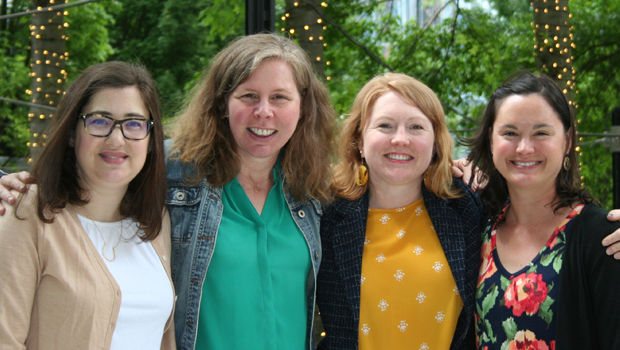Personal experiences inspire study of young patients and caregivers

Research team members Dori Rosenberg, Karen Wernli, Heidi Berthoud, and Sarah Evers
Drs. Dori Rosenberg and Karen Wernli lead a team with first-hand knowledge of complex conditions and care
by Assistant Investigator Dori Rosenberg, PhD, MPH, and Associate Investigator Karen J. Wernli, PhD, Kaiser Permanente Washington Health Research Institute (KWHRI)
We are KPWHRI scientists whose research is dedicated to improving health care. We also have a special perspective because of our recent personal experiences with the health care system. In 2017, Dori had a double lung transplant and recuperated in the hospital and at home for a few months. The same year, Karen, who has two children, became her husband’s caregiver after he had what his cardiologist called “the Super Bowl of cardiac surgeries.” Our research team members Heidi Berthoud and Sarah Evers also have personal experiences with health care. Heidi had two abdominal surgeries for endometriosis, a complicated and poorly researched disease that affects 1 in 10 women, and in Sarah’s mid-20s, she was the caregiver of her fiancé, who passed away from a rare cancer.
We’re all grateful for our health now and glad to be back to work. But we realized that we have a new perspective on health care research, as people in our 30s and 40s who have been patients and caregivers. We all emphasize patient perspectives in our research: Karen studies cancer, Dori focuses on behavior change around physical activity, and Heidi and Sarah have years of experience in patient engagement and patient-centered care.
As we spoke to each other and with others at KPWHRI, we realized that as scientists, we’re taught to be objective — yet our experiences can’t help but inspire our work. We also recognized how little support younger adult patients and their caregivers have, especially when dealing with complicated medical conditions. Since few people in their existing social networks have handled complex illness, young adult patients and caregivers may feel isolated and have difficulty finding people who have had similar experiences. For these reasons, many on our team turned to online resources to find others in our positions.
Experiences inspire a new project
We now lead a team supported by the KPWHRI Development Fund that is laying the foundation for a study on the needs of young adult patients and caregivers. We are guided by an advisory group of KPWHRI investigators who have experiences similar to ours as patients with complex medical conditions or caregivers. This summer, we will survey and later interview Kaiser Permanente Washington members who are young adults and have a complicated medical condition or support someone who does. We also plan to survey and interview physicians for their perspectives. We’re especially interested in hearing about experiences with peer support — how young adults are using it, which types of support they prefer, and the role of their care team in helping with online peer support sources.
Peer support is an early focus of our project because evidence shows it has value for providing knowledge, confidence, and motivation toward positive quality of life. We also personally understand the worth of peer support. As helpful as clinical teams are, they have limited time and often no lived experience with a particular medical condition, especially if it is rare. Our goal is to make it easier for young adult patients and caregivers to get connected to quality clinical and emotional support.
Follow along for findings
Our project launches this week. Our study team is mailing letters to Kaiser Permanente Washington members aged 25 to 45 years who have agreed to be contacted about research. If you receive a letter or email, please consider participating if our study is appropriate for you.
We’re excited about this project, which integrates our professional interests and personal experiences. Please follow along. As we learn, we’ll post updates on social media (@DoriRosenberg, @WernliKarenJ, @heidiberthoud) and may post again to this blog.
Learn more about Kaiser Permanente Washington Health Research Institute. Sign up for our free monthly newsletter.


